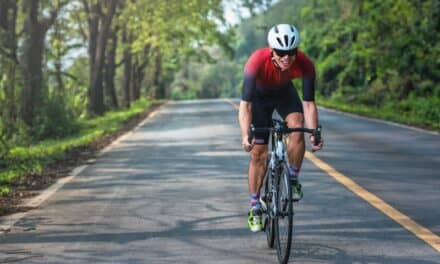In conjunction with physical therapists at a nursing home, a researcher from Aalborg University in Denmark conducted a study in which the home’s elderly residents combined exercise with virtual reality.
“All too often the elderly end up sitting and looking at a wall or staring passively into a television. As a rule they’re usually not particularly motivated to exercise, partly because getting moving again after a long period of inactivity can cause pain, and partly because it’s not particularly interesting to sit and look at a wall while you bike,” says Jon Ram Bruun-Pedersen of the Multisensory Experience Lab in the Department of Architecture, Design and Media Technology at Aalborg University Copenhagen, in a media release from Aalborg University.
As his PhD project, Pederson designed the study, suggesting that virtual reality could be just the thing to motivate seniors to ride exercise bikes.
First, in conjunction with physical therapists at the Copenhagen nursing home Akaciegården, he set up large TV screens in front of the exercise bikes in the activity room. The screens enabled the 21 study participants to ride through various virtual landscapes on the TV screen while they exercised.
“The study showed that seniors were really happy with the experience,” Bruun-Pedersen states. “They really lived it and felt as if they had to pedal extra hard to get up the hill on the screen — even though they really didn’t feel higher resistance on the bike.”
Next, he equipped the participants with virtual reality goggles, which have small screens in front of the eyes and give the illusion of being part of the environment. For the participants, they experienced being outside, even though they were still on an exercise bike in the physical therapy room at the nursing home, per the release.
“We set the study up so the participants could ride in the same landscapes they knew from the screens. They took to the experience amazingly well. For many people stepping into a virtual world can be an overwhelming experience, but the elderly subjects had a surprisingly high tolerance threshold,” Bruun-Pedersen explains.
Bruun-Pedersen notes that, for the elderly participants, the beneficial effects of virtual reality are more than just staying in shape; it’s getting outdoors and experiencing something.
“It may well be you can’t get out of the nursing home and take a plane to Mallorca or a bus to the Harz mountains, but you can experience what it’s like to go for a walk in the mountains or visit some of the world’s great attractions. It could also be that you’d like to go for a walk in your childhood neighborhood or something else that has had great significance,” he says. “The possibilities are there with virtual reality.”
[Source(s): Aalborg University, Science Daily]





